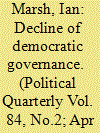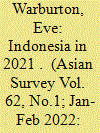| Srl | Item |
| 1 |
ID:
122484


|
|
|
|
|
| Publication |
2013.
|
| Summary/Abstract |
Why has democratic governance declined, at least in the Anglo-American world? This essay maps the causes. It starts with the major parties, once basic agents of mass mobilisation and representation. It argues that a cascading series of developments, often involving contingent adjustments to immediate exigencies, have, in a longer perspective, created a fundamental gap between the political system and its publics. A second section then sketches paths to democratic renewal. How might this gap be closed? What other changes might be required to make this a reality? Are prospects of change fanciful?
|
|
|
|
|
|
|
|
|
|
|
|
|
|
|
|
| 2 |
ID:
187246


|
|
|
|
|
| Summary/Abstract |
We know surprisingly little about the impact of democratic decline in the EU on foreign policy and on democracy promotion efforts in particular. We examine qualitative and quantitative changes in aid allocation for democracy promotion alongside declining levels of democracy in the EU and its members. Focusing on decision-makers’ perspectives, we explain these changes with strategic and constructivist approaches. We analyse multilateral and bilateral aid flows from the EU and its members to Central Asia with data from OECD and IATI from 2000 to 2018. We identify quantitative changes in aid promoting democracy in Central Asia, which can be partially attributed to the donors’ increasing challenges for democracy at home. While the overall aid levels remained stable, we also identify qualitative shifts in allocation patterns favouring government institutions rather than civil society organisations. Our findings address the impact of democratic decline on foreign policy towards non-democratic states outside the European neighbourhood.
|
|
|
|
|
|
|
|
|
|
|
|
|
|
|
|
| 3 |
ID:
165861


|
|
|
|
|
| Summary/Abstract |
We explore what can be learned from authoritarian backsliding in middle income countries about the threats to American democracy posed by the election of Donald Trump. We develop some causal hunches and an empirical baseline by considering the rise of elected autocrats in Venezuela, Turkey, and Hungary. Although American political institutions may forestall a reversion to electoral autocracy, we see some striking parallels in terms of democratic dysfunction, polarization, the nature of autocratic appeals, and the processes through which autocratic incumbents sought to exploit elected office. These processes could generate a diminished democratic system in which electoral competition survives, but within a political space that is narrowed by weakened horizontal checks on executive power and rule of law.
|
|
|
|
|
|
|
|
|
|
|
|
|
|
|
|
| 4 |
ID:
185204


|
|
|
|
|
| Summary/Abstract |
A devastating wave of COVID-19 infections cast a long shadow over all political and economic developments in Indonesia in 2021. Many of the patterns and trends identified in this journal’s previous year-end analysis intensified in 2021, with a deepening of pandemic-induced crises, immense loss of life, and further erosion of democratic norms and institutions, including unprecedented intervention into a corruption watchdog and a major business association. The administration of president Joko Widodo has focused almost exclusively on economic development and business investment throughout the pandemic; but the spread of the Delta strain forced a shift in the government’s approach to lockdowns, prompting new concerns about rising poverty and inequality.
|
|
|
|
|
|
|
|
|
|
|
|
|
|
|
|
| 5 |
ID:
188426


|
|
|
|
|
| Summary/Abstract |
Multilateralism at the regional and global stage is essential for Indonesia’s foreign policy. Apart from ASEAN, which has long been a pivotal array for Indonesia’s regional economic interdependence and political stability, the G20 is recently added to the country’s interest. It serves Indonesia’s desire for global leadership and middle-power status. As Indonesia began its year-long presidency of the G20 in 2022, the government is confident that hosting numerous meetings and the Group’s summit at the end of 2022 is a notable milestone for its international leadership exposure. This time, Indonesia’s President Joko Widodo emphasises priority agendas: strengthening global health architecture, transitioning to green and renewable energy, and promoting the digital economy. This commentary evaluates and projects Indonesia’s G20 presidency amidst the country’s democratic decline in recent years. It argues that Indonesia’s proposed agendas are more ambitious goals than strategic. Instead, the country’s priority will be marked by a solid neoliberal economic policy and stability, which is likely to cause even more democratic setbacks at home.
|
|
|
|
|
|
|
|
|
|
|
|
|
|
|
|
| 6 |
ID:
162393


|
|
|